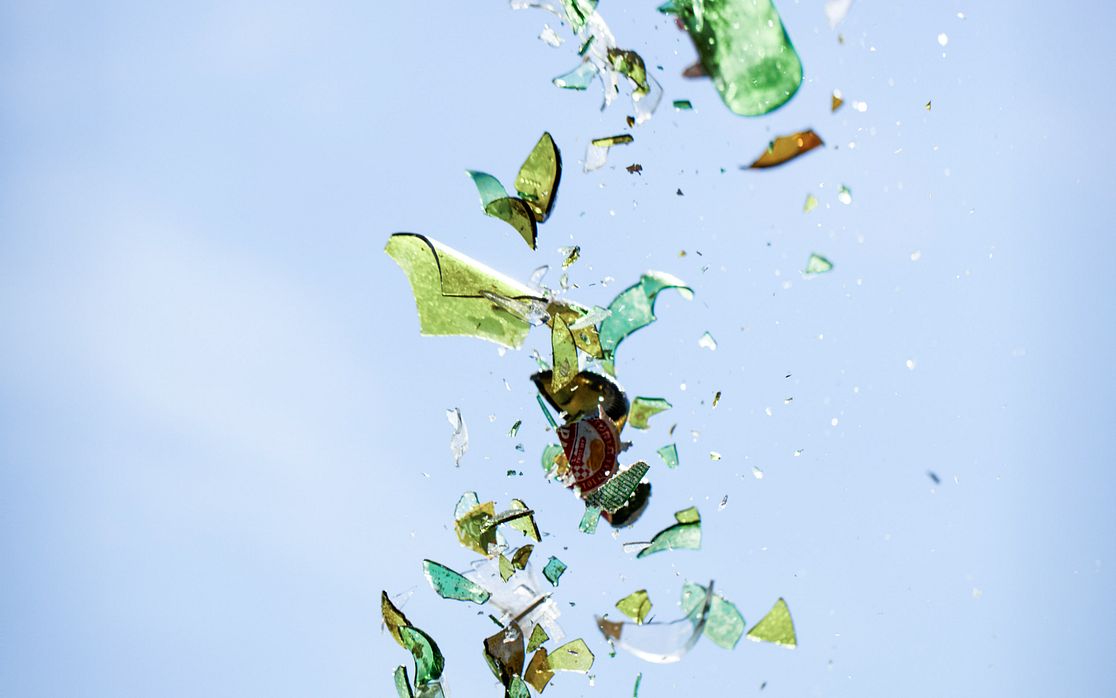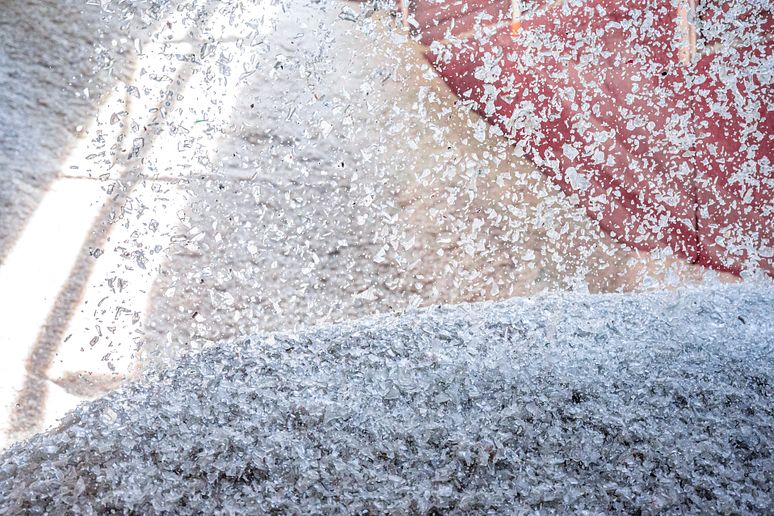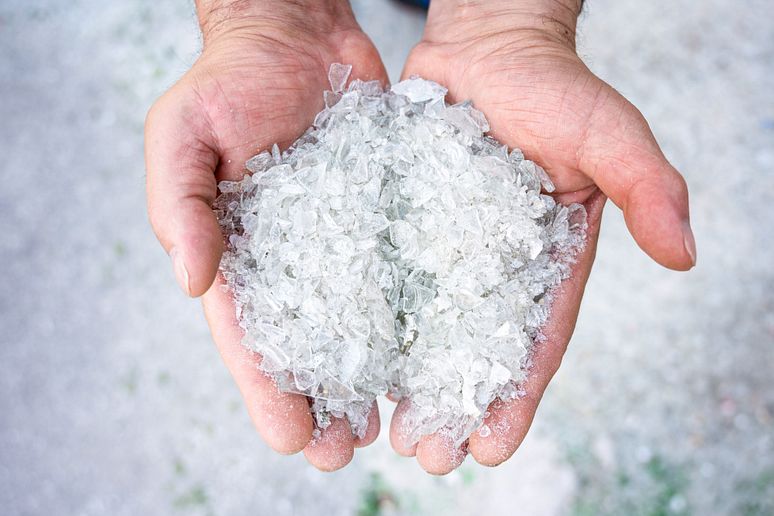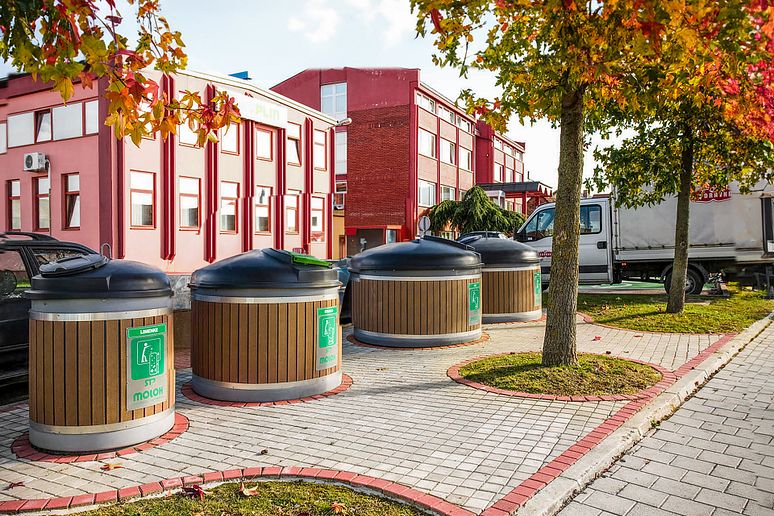Digital recycling
08/2024: How do you get consumers to consistently recycle the glass packaging they use? Producers in the glass, food, and beverage industries, environmental organisations and governments around the world ask themselves that very question. In the Croatian city of Koprivnica, Vetropack Straža d.d. has teamed up with the European Container Glass Federation (FEVE), Podravka Inc. – a multinational company and one of the country’s leading food producers – and local municipal service provider Komunalac d.o.o. in a pilot project that aims to answer this question.
Used glass packaging is a vital resource: re-using it reduces both the consumption of raw materials and the energy required in glass production, as melting down used glass requires less energy. This results in fewer carbon emissions per new container – making it all the more important that recyclable glass actually reaches the recycling cycle. For various reasons, this does not always happen. Infrastructure for glass collection, transport, and recycling may not work as efficiently as it should, or might be inadequate as yet. Additionally, consumers may simply be unaware of the potential of glass recycling or the right way to do it. That’s why FEVE is an active partner of Close the Glass Loop –a multi-stakeholder platform where players from the entire value chain come together with the goal of achieving a 90 percent collection rate for glass packaging in the EU by 2030 (current rate: 80.1 percent).
Building effective partnerships to communicate with consumers and raise their awareness is one of the most important factors that can be leveraged to achieve this goal. “As a European organisation, we depend on local partners like companies and local authorities who can activate their existing networks and infrastructures and draw on their deep knowledge of the situation in their area. In return, we provide them with resources, communication materials and advisory support. We are all working towards the same recycling goal, just from different angles,” explains Michael Delle Selve, Head of Marketing and Communications at FEVE.
Local partnerships for sustainable glass recycling
In the Croatian city of Koprivnica, these local partners are Vetropack Straža d.d., food producer Podravka Inc. and the municipal services company Komunalac d.o.o. With the Digital Recycling Pilot Project, a digital campaign designed to educate consumers and raise awareness, they are addressing the challenge of achieving a higher collection and recycling rate in Croatia’s glass recycling system: under the Deposit Return Scheme (DRS), a small deposit is paid back to consumers when they return bottles with capacity of 200 ml or more to shops from where private companies collect them. An estimated 80 percent of containers covered by this system are collected for recycling. Glass jars of all sizes and smaller glass bottles, however, are covered by the Extended Producer Responsibility (EPR) system: they are collected elsewhere in communal containers from which municipal services transport them to recycling plants. Only about 30 percent of all containers with capacity of less than 200 ml are collected under this system. The remaining 70 percent go to waste, dragging the overall national glass collection rate down to 59 percent. Compared to the EU average, this leaves Croatia with significant room for improvement.
The Digital Recycling Pilot Project campaign was launched to investigate what lies behind the lower success rate of the EPR system: lack of motivation because there is no reward (as compared to the DRS system), or lack of awareness about glass recycling in general. It started off with an online survey specifically targeted at the citizens of Koprivnica. Campaign messages were then tailored to address the survey findings, and visual materials were added featuring Podravka’s products in glass jars.
Success factors for the glass recycling campaign
Strategic distribution of the campaign images via FEVE’s social media channels will start in autumn of this year. Continuous data collection throughout the campaign includes tracking of various factors: for example, which messages, visuals, and channels reached the most consumers, and how this actually influenced glass collection volumes. When the campaign finishes towards the end at approximately the end of the year, this data will be analysed, evaluated, and benchmarked against data collected from Čakovec, a similar city without a campaign of this sort, which serves as a control group. The ultimate outcome will be a communications toolkit and blueprint that can be used for future campaigns, regardless of the country. While both FEVE and Vetropack Straža provide financial support for this project, each participant contributes to its success in distinct ways: the Vetropack team undertakes a significant portion of the organisational tasks and provides translations for the campaign.
As Vetropack Straža d.d. operates the only glass producing plant in the country, its working connections were crucial and instrumental in bringing both Komunalac and Podravka on board in the project. And as the producer of many popular brands, Podravka gives the campaign the visibility it needs. “We immediately recognised the value of this project,” says Nataša Mikuš Žigman, Director of Sustainability at Podravka. “We have set ourselves the goal of using only recyclable, returnable or compostable packaging for our products by 2030. Glass can help us fulfil this ambition – and we want to help make sure that the glass we use does get recycled.” Komunalac acted as local advisor for the project and provided data support. “We are also ideally positioned to measure the actual impact on the volume of glass we collect for recycling. We're hoping to see a marked increase,” says Saša Grubačević, Head of Waste Management Department at Komunalac d.o.o. As well as handling joint project coordination, FEVE designed the communications approach for this project and will ultimately evaluate the data. All four partners hope that the glass recycling rate in Koprivnica will climb significantly, and they look forward to the results of their joint efforts being used for future campaigns in Croatia or abroad.
«We have set ourselves the goal of using only recyclable, returnable or compostable packaging for our products by 2030. Glass can help us fulfil this ambition – and we want to help make sure that the glass we use does get recycled.»
Read more




